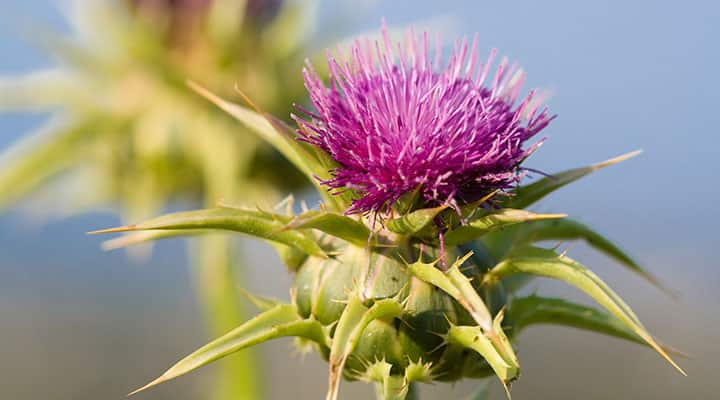
NAC vs. Milk Thistle: Which Is Best for Your Liver?
Published: July 2024
Living a healthy lifestyle is not a walk in the park (although, walks in the park can definitely be part of one!). What we eat, how much we sleep, how often we move, and how well we manage our stress are crucial components of our well-being. And some of the hardest work goes on behind the scenes. Case in point: your liver.
Your liver is a powerhouse organ that plays a vital role in how your body functions. It produces bile to help you digest fats and absorb nutrients; it stores glucose to prevent a shortage of energy when needed; it helps manage fat metabolism; it filters out undesirable compounds from your blood that can impact your health; and the list goes on.
Unfortunately, sedentary lifestyles and typical Western diets negatively impact liver health, limiting its ability to perform essential tasks. The good news? You can complement your wellness journey with dietary supplements to help your liver do its job. Cue N-acetyl-L-cysteine (NAC) and milk thistle, two of the most promising liver health supplements.
But which one is better for your health needs? Let's dive in to learn more.
How does NAC support liver health?
N-acetyl-L-cysteine, or NAC for short, is an acetylated form of the amino acid cysteine, and it's a direct precursor (or building block) to glutathione, the master antioxidant in the body. NAC can help protect your liver from its daily exposure to oxidative stress by supporting healthy glutathione levels and protecting liver cells from free radical activity. NAC supports healthy liver enzyme levels; these specialized proteins help speed up chemical reactions, so your liver can do its job efficiently.
Not only is NAC a precursor to glutathione, but it also acts as an antioxidant in the body. Why does antioxidant support matter? Think of your liver as a filter that works 24/7 to clean your bloodstream so your cells get the nutrients they need and nothing more. NAC can shield your hardworking filter from reactive oxygen species (ROS), which are free radicals that can have a negative impact on your cells, not to mention your liver.
How does milk thistle support liver health?
What about milk thistle? This purple, prickly flowering herb is native to the Mediterranean region, and it's been used for thousands of years as a hepatoprotective herb. The active compounds, flavonolignans like silymarin, in milk thistle are responsible for its liver-friendly benefits. Like NAC, silymarin has antioxidant properties and acts as a free radical scavenger. It helps encourage healthy liver cell growth and repair, promotes liver health and function, encourages healthy glutathione levels in the body, and supports the liver's natural detoxification process.
Should you take NAC or milk thistle for liver health?
Although more clinical research is needed to understand how they work with the body, both NAC and milk thistle show promising results in supporting liver health. Since the liver's primary job is to filter out waste and substances from our blood, it releases free radicals that can impact liver function and expose liver cells to oxidative stress on a daily basis.
You can take NAC or milk thistle (or both!) to help your liver. Your choice will depend on your needs and preferences. For example, if you're looking for a supplement to support your liver and immune health (more on this later), NAC would be the ideal choice. On the other hand, if you're looking for liver-focused support, milk thistle would be a good option. And it's always a good idea to speak with your doctor before you add a new supplement to your routine.
Can you take NAC and milk thistle together?
Yes, NAC and milk thistle can be taken together. There are no adverse interactions between the two supplements, and clinical studies show they are both safe in therapeutic dosages and even tolerated in higher dosages. Not surprisingly, you'll find both in many liver-friendly dietary supplements to support optimal liver health.
Whether you add milk thistle or NAC to your wellness routine (or any supplement for that matter), follow the directions on the label. And it never hurts to speak with your doctor to ensure either supplement is right for you.
Explore Our Best Milk Thistle Supplements
What happens if you take NAC and milk thistle daily?
As we've seen, NAC and milk thistle are proficient free radical scavengers that confer hepatoprotective benefits, but their role goes beyond antioxidant protection. NAC also supports immune, bronchial, and respiratory health; it also supports your body's production of glutathione. As if this weren't enough, NAC and milk thistle supplements help maintain cytokine levels already-within a normal range and encourage a healthy inflammatory response.
5 tips for liver health success
Your liver has a heavy workload, but it's never too late (or early) to show it you care. Here are five tips on how to keep your liver in top-notch health.
Eat your way to a healthy liver:
The proper nutrition is key for liver function. Choose foods that support the health of your liver, including cruciferous vegetables and leafy greens, nuts, berries, fatty fish, beets and more. Clean eating supports your body's natural detoxification efforts. And don't forget to drink plenty of water!Limit highly processed foods:
Always read the label and avoid foods that strain your liver. Excess fats, salt, sugars and additives can burden your liver.Smart supplementation: Fill in any dietary gaps with must-have supplements, including CoQ10, vitamins B, C, and E, and minerals like selenium and zinc. And, of course, add supplements like NAC or milk thistle to your daily regimen.
Limit alcohol consumption:
Alcohol can add more strain to your liver and negatively impact its health and function. Pro tip: Try mocktails! They are an excellent alternative for a fun night that's easy on your liver.Sweat for liver support:
Exercise does wonders for your mental and physical health, but your heart-pumping workout also promotes liver health and function. That's because you're engaging muscles, breathing heavily and actively moving, which promotes healthy blood sugar levels, encourages healthy insulin sensitivity, helps manage a healthy weight and much more. Remember, the best exercise is the one you do consistently. It can be swimming, dancing, jogging, or Pilates, but try to carve out 20 to 30 minutes a day, at least five days a week to reap the liver-boosting benefits of full-body movement. Pro tip: Mix it up! Incorporate weightlifting and resistance training at least twice a week to tone and maintain muscle mass.
So, whether you choose milk thistle or NAC, you're taking the right steps to help support your liver and the essential job it does at keeping you healthy from head to toe.
References
- Achufusi TGO, et al. "Milk Thistle." Stat Pearls. February 2024. https://www.ncbi.nlm.nih.gov/books/NBK541075/
- Calverley P, et al. "Safety of N-acetylcysteine at high doses in chronic respiratory diseases: A review." Drug Saf. March 2020. https://www.ncbi.nlm.nih.gov/pmc/articles/PMC7892733/
- Ghiasian M, et al. "Antioxidative effects of silymarin on the reduction of liver complications of fingolimod in patients with relapsing-remitting multiple sclerosis: A clinical trial study." J Biochem Mol Toxicol. August 2021. https://pubmed.ncbi.nlm.nih.gov/33934443/
- Gillessen A, et al. "Silymarin as supportive treatment in liver diseases: A narrative review." Adv Ther. February 2020. https://www.ncbi.nlm.nih.gov/pmc/articles/PMC7140758/
- Hashemi G, et al. "A pilot study to evaluate the effects of oral N-acetyl cysteine on inflammatory and oxidative stress biomarkers in rheumatoid arthritis." Current Rheumatology Reviews. 2019. https://pubmed.ncbi.nlm.nih.gov/30255760/
- Hong T, et al. "The role and mechanism of oxidative stress and nuclear receptors in the development of NAFLD." Oxidative Medicine and Cellular Longevity. October 2021. https://onlinelibrary.wiley.com/doi/10.1155/2021/6889533
- Kheong CW, et al. "A randomized trial of silymarin for the treatment of nonalcoholic steatohepatitis." Clinical Gastroenterology and Hepatology. 2017. https://www.cghjournal.org/action/showPdf?pii=S1542-3565%2817%2930459-7
- Khoshbaten M, et al. "N-Acetylcysteine improves liver function in patients with non-alcoholic fatty liver disease." Hepat Mon. March 2010. https://www.ncbi.nlm.nih.gov/pmc/articles/PMC3270338/
- Mulrow C, et al. "Milk thistle: Effects on liver disease and cirrhosis and clinical adverse effects: summary." AHRQ. 2000.https://www.ncbi.nlm.nih.gov/books/NBK11896/
- Quig D. "Cysteine metabolism and metal toxicity." Altern Med Rev. August 1998. https://pubmed.ncbi.nlm.nih.gov/9727078/
- Sacco R, et al. "Glutathione in the treatment of liver diseases: Insights from clinical practice." Minerva Gastroenterol Dietol. December 2016. https://pubmed.ncbi.nlm.nih.gov/27603810/
- Shavandi M, et al. "Silymarin (Livergol®) Decreases Disease Activity Score in Patients with Rheumatoid Arthritis: A Non-randomized Single-arm Clinical Trial." Iran J Allergy Asthma Immunol. April 2017. https://pubmed.ncbi.nlm.nih.gov/28601049/
- Soleimani V, et al. "Safety and toxicity of silymarin, the major constituent of milk thistle extract: An updated review." Phytother Res. June 2019. https://pubmed.ncbi.nlm.nih.gov/31069872/
- "Acetylcysteine." LiverTox: Clinical and Research Information on Drug-Induced Liver Injury. November 2016. https://www.ncbi.nlm.nih.gov/books/NBK548401/
- "Fighting Fatty Liver. Steps Against a Silent Disease." News in Health. October 2021. https://newsinhealth.nih.gov/2021/10/fighting-fatty-liver
Always be in the know!
Access the latest deals, wellness news, expert health tips & more!











